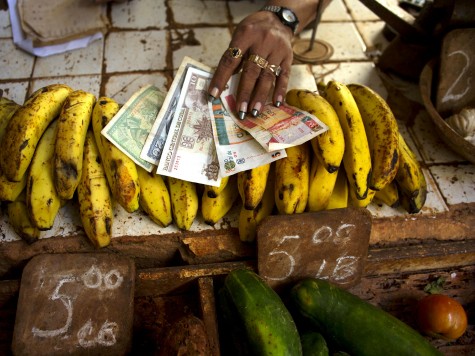
President Raúl Castro announced today that his government will pass laws in March targeted at attracting foreign investment in Cuba, the latest of several similar reforms aimed at opening up Cuba’s market without threatening the authoritative nature of the Castro regime.
These may be a sign that Castro wants Cuba to look more like China.
Castro did not announce any details, stating only that the National Assembly, a group of communist party leaders that, from afar, appear to form something like a legislative branch, will convene and discuss the matter of foreign investment. Foreign investment has been notoriously elusive to Cuba outside of decades of subsidies from the Soviet Union and its oil subsidies from Venezuela today.
The news comes on the heels of two other major reforms in Cuba’s economy: the end of the restriction on car exports and the phasing out of Cuba’s tourist-only dollar currency.
The former will change the physical look of the island, as most residents continue to use decades-old pre-revolutionary cars as their only means of transportation. Before the current reform, the purchase of foreign cars could only be allowed through a permit obtained exclusively by highly-paid communist party leaders, artists promulgating the socialist message abroad, or state-sanctioned artists. Cubans who subsist off of money from their American relatives, formerly denied access, will now be able to purchase more modern automobiles. This incentivizes foreign car companies (with the exception of embargoed American companies) to sell to the Cuban market and means that more people will need to buy gasoline, which benefits oil-rich socialist ally Venezuela.
The change in currency also signals an opening for foreigners to dump more money into Cuba’s economy. For decades, Cuba has had two currencies in circulation: the peso, calibrated to the Cuban economy and worth four cents on the dollar, and a tourist-only currency pegged to the American dollar. Without the latter, most Cubans could not enter tourist-only hotels, restaurants, bars and other establishments, creating a de facto apartheid system that prevented many tourists from interacting with native Cubans. This system is not particularly threatened by the elimination of the tourist currency — after all, prices will remain exorbitant in tourist locales for the average Cuban. What it will do, however, is make foreign money much more valuable on the island. Tourists will be able to convert their dollars into a currency that is worth four cents for every dollar. Even if tourist locations will have prices too expensive for native Cubans, the prices will still appear low to foreigners whose money is so much more valuable internationally. This incentivizes them to spend more, similar to how U.S. tourism in Europe rose so rapidly as the value of the Euro declined.
It’s no secret that Cuba’s communist system has wrecked the island’s economy, leaving tourism to meagerly feed a nation with no other industry to provide for itself and isolating it from the global market. These reforms indicate that even those in power are finding the system unsustainable. However, they absolutely do not hint towards a blossoming of free market enterprise or capitalist ideals like freedom of expression. They only serve to prove that Castro and his cronies are betting on the Chinese government’s clever evolution into a giant presence in the global capitalist system.
Like China, Cuba hopes to be a nation that can actually financially sustain oppressing its citizens and denying them civil rights.
The one problem with this approach is, of course, that Cuba is no China. Airplanes and the fall of the Soviet Union have made Cuba much less geographically valuable than it once was, and significantly less so than China, one of the world’s biggest nations and neighbor to Russia, Japan, and North Korea. It has few natural resources (no oil, some sugar and coffee) and the socialist government has done nothing to cultivate them. Simply put, Cuba does not have the political or economic leverage to get away with this maneuver.
To the extent that this means Cubans will enjoy a more open market, however, it is non-negligible good news. Open markets force cultures to evolve, even ones as isolated as Cuba, and the government’s gamble indicates only desperation, not cleverness. The risk of allowing Cubans the autonomy of free enterprise promises little in the way of a bright future for Cuba’s communist leaders.

COMMENTS
Please let us know if you're having issues with commenting.